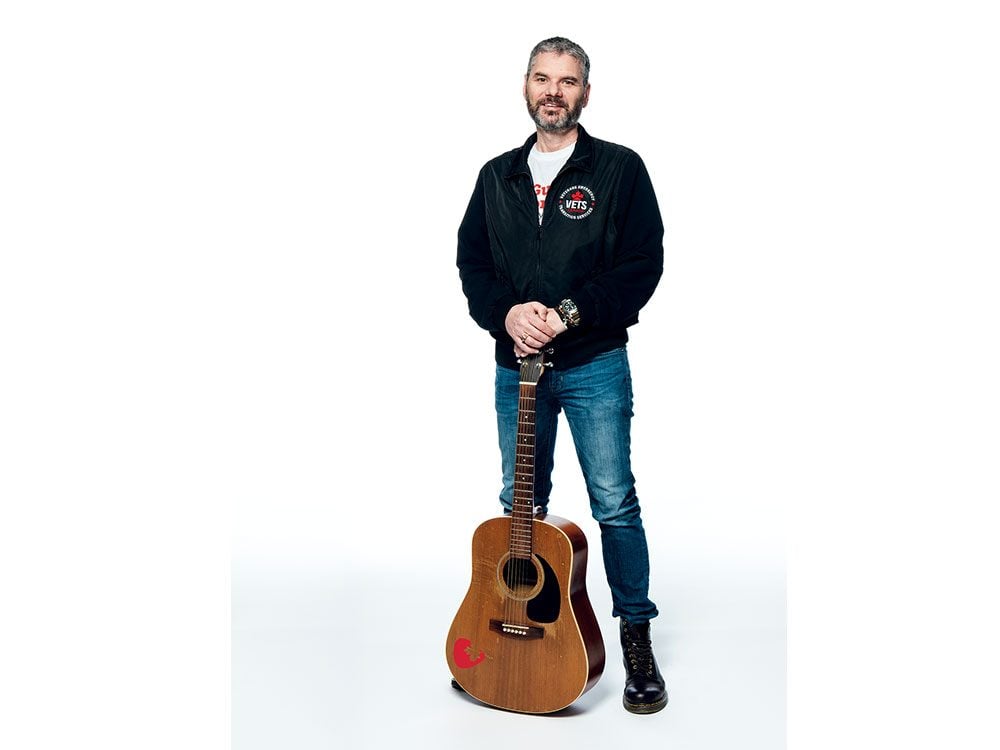This Canadian is Pairing Members of the Military with Guitars to Combat PTSD
Guitars for VETS Canada uses music to give veterans a new-found sense of hope.

Moving On From PTSD Through Music
John Benoit will never forget the moment he set eyes on “Valerie,” the guitar that helped him sing his way back to life. In 2005, suffering from severe post-traumatic stress disorder, the once-extroverted medic quit the army. For the next decade, he lived off his military pension while holed up in a cottage in rural Nova Scotia with his pet rabbit, dog and two cats. But last May, when a friend told him about Guitars for VETS Canada—a charity that matches gently used instruments with disabled veterans—Benoit decided it was time to make a move.
The self-styled hermit had not interacted in a group setting in years, and the drive to the program’s headquarters 50 kilometres away in Halifax left him panicked. By the time he arrived at his destination, Benoit’s heart was pounding and he was dripping sweat.
After scanning the room for exits through which he could escape if necessary, he tried out a few guitars. Nothing. Then he picked up a dented, gold-hued Hohner and strummed several notes. As the acoustic guitar vibrated against his chest, Benoit felt stress seep out of his body. “There was an immediate bond,” he says. “It was like falling in love.”
Jim Lowther, a 47-year-old army veteran and the founder of Guitars for VETS Canada, had fallen first. He served in Bosnia in 1997, and though the war had ended, its ramifications and the ethnic divide were still very real. When a young Bosnian cook working for his unit was murdered, Lowther felt he should have done more to protect her. After returning to Canada, he was tormented by visions of her corpse. “The past would come on like a freight train,” he says.
Lowther hid in the basement of his Halifax bungalow to avoid lashing out at his wife, Debbie, and their three children. On one especially difficult day in 2010, he grabbed a guitar and started playing “I Should Have Known Better” by the Beatles. As he concentrated on the song, old ghosts retreated and the present moment flickered into focus. Then, a miracle: an instant of peace. “The crazy thoughts in my head had stopped,” he says. Lowther began playing regularly.
Though Lowther’s own mental health gradually improved, many of his fellow combatants were suffering. A spate of military suicides in early 2014—five deaths within a few weeks of each other across Canada—shook him deeply. “I’d been in that darkness, in a place where I’d thought of dying,” he says. Hoping to help others find solace, he decided to spread the music.
Today, Guitars for VETS Canada has more than 100 volunteers, with team leaders in major cities coordinating the delivery of guitars to veterans and still-serving soldiers. The music industry has also stepped up: the music-store chain Long & McQuade is the drop-off and pick-up point for the donated guitars; professional instructors offer 10 free lessons to newly enrolled participants; and Great Big Sea’s Séan McCann raised $50,000 for the organization at a benefit concert in 2017.
To date, the charity has served more than 1,000 former and current members of the military, who are referred by their compatriots, therapists and case managers from Veterans Affairs Canada. “We’ve had vets tell us that the guitar we sent helped them cut back on their medications, or even saved their lives,” says Lowther.
As for Benoit, Lowther’s organization coaxed him out of his comfort zone. A month after claiming “Valerie,” Benoit enrolled in music lessons with other retired service personnel. During breaks, the group swapped combat stories. As he recognized similar struggles in his fellow students, his feelings of alienation abated.
“The Guitars for VETS Canada program gave me back the sense of belonging I’d lost,” Benoit says. “And with that came hope.”
Next, find out how this amazing calendar is used to help Canadian veterans.



